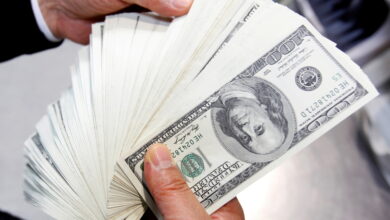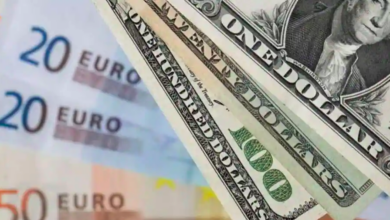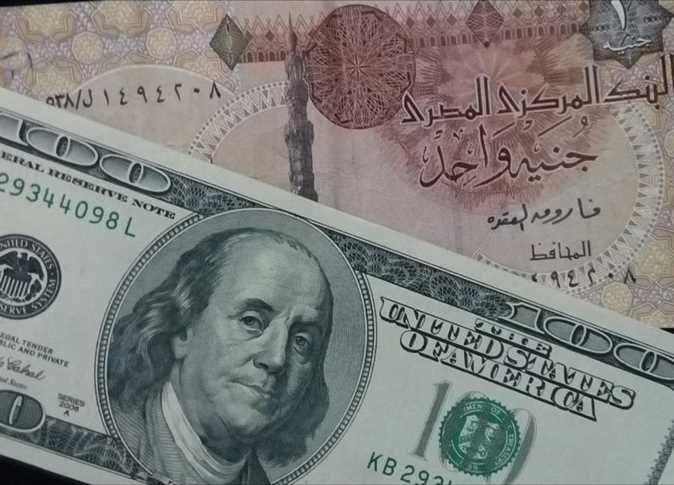Central Bank of Egypt (CBE) leaders introduced a series of measures to stop banks and individuals from buying dollars in the past week, as the Egyptian pound continues its worst downwards slide since the January 2011 uprising.
Meant to put a stop to the recent nation-wide run on banks and exchange offices for dollars, the measures signal that the bank is re-positioning itself for the long-expected devaluation of the Egyptian pound.
A devaluation would mark a turn in currency management for the bank, which has spent more than US$20 billion bolstering the pound over the past two years.
Falling to a new all-time-low, the pound reached a selling price of LE6.423 on Monday, banking sources told Reuters.
The panicked rush to convert to dollars has exacerbated the crunch on the main foreign currency.
Bank officials said in a statement Saturday that they have introduced a new auction system for buying and selling the dollar, and warned that the country’s foreign reserves have reached a “critical” level.
At Sunday’s inaugural auction, the CBE sold $74.9 million to banks, and said the weighted average bid price was LE6.2526 to the dollar, Reuters reported. In the interbank market, the pound bid at 6.185 to the dollar. Bankers told Reuters that the pound’s rate was at 6.30.
On Monday, the bank auctioned off the same amount and the pound continued its fall, with a cut-off price for dollars of LE6.2425, according to Reuters.
Mohamed al-Abyad, head of the foreign exchange division at the Egyptian Federation of Chambers of Commerce, told Egypt Independent that the exchange rate was not set on Sunday since currency exchanges offices were unable to buy or sell due to a dearth of dollars.
The bank has also placed a $30,000 daily foreign-currency withdrawal cap on corporate accounts, charged extra fees on currency exchange for individuals, and banned travelers from carrying more than $10,000 in or out of the country.
“The Central Bank is trying … to counter the results of the poor management of the country,” says Salwa Antary, former head of research at the National Bank of Egypt and head of the economic committee of the Revolutionary Socialists Party.
The slide
The Egyptian pound has gradually fallen more than five percent since the 25 January uprising, but it has been on an even sharper decline from a rate of 6.09 since 22 November, when President Mohamed Morsy issued a controversial constitutional declaration that sparked protests and political unrest.
Sentiment darkened further after the divisive constitution was passed in a rushed referendum, while political tensions showed no signs of easing.
According to the CBE, reserves are at the lowest level needed to meet the country’s international debt requirements. The last available figures from November show that foreign reserves stood slightly above US$15 billion, despite recent deposits from Qatar meant to ease the crisis.
Economic experts say this level barely covers three months of imports, a red line for many countries. Without sufficient foreign reserves, Egypt will be unable to supply the consumer market with vital commodities.
Conflicting reports last week about the resignation of CBE Governor Farouk al-Oqda, which were later denied, further dented market sentiment and created panic.
In a clear attempt to quell anxiety, Oqda soon after attended a meeting of the government’s economic committee.
The bank’s recent departure from its traditional façade of mystery and secrecy also indicates that it might have decided on a set path toward devaluation. In the past, when the bank interfered in foreign exchange markets to keep the pound’s value high, it remained notoriously tight-lipped about policies.
With serious changes to the country’s currency value ahead, though, it seems Central Bank leaders have decided that a series of careful public reassurances and calculated public policies are necessary.
In one statement last week, the bank affirmed its commitment to guaranteeing all deposits in local and foreign currencies in Egyptian banks, a tenet that experts say should be so basic to the bank’s mandate that it’s frightening that officials felt the need to clarify it.
Black market fears
The Central Bank’s actions are also meant to stifle any emerging black currency markets, which some indicators show are already taking shape.
Last week, when the CBE was listing the dollar as selling at 6.18 to the Egyptian pound, buying dollars at currency exchanges proved costly, with a rate that reached 6.25, confirming the resurgence of a black market.
Egypt had managed to quell black market trading when it decided to practice a policy of a “managed float” in 2003, which, in theory, allows the currency to rise and fall in accordance with market pressures, but only within pre-determined bounds.
At a currency exchange office in Cairo’s upscale district of Maadi last week, there were no dollars on hand but the staff offered customers euros instead. A number of banks also said they were low on cash dollars, pushing people to seek other foreign currency at a higher price from exchanges around Cairo.
“I want to exchange money because I heard that the Egyptian pound is losing its value — better safe than sorry,” said one customer waiting at the currency exchange office.
Bankers said the dollar run left banks and money exchangers short, but confirmed that more bank notes were on their way from abroad.
“Cash is the problem. We had a shortage in cash dollars these last few days; consequently it may be difficult for depositors to take out their money,” said a senior manager in treasury at BNP Paribas, who spoke on condition of anonymity.
He expected the shortage to end within two weeks.
Egyptian banks have recently imported around $300 million to $500 million to cover the shortage, the senior manager said, a sizeable amount by global standards.
“The problem is that they [bank customers] take the dollars and keep them stashed at home, which cuts the cycle of buying and selling and creates a shortage,” he said. “With rumors that the dollar will reach LE7.50, [some believe] they are set to make a significant profit.”
But according to the senior manager, the problem is limited to cash dealings. Banks are still able to provide dollars for imports and corporate transactions, which is vital.
He also predicts the problem will fizzle out when those who rush to buy dollars realize that they will not make the expected profit. On the contrary, he expects those medium savers who rushed to change their pounds to dollars, sometimes at prices higher than 6.25, to incur losses.
No surprise
Analysts have been warning of the country’s shrinking reserves and asking how the government and the CBE will readjust to a lower currency value for over a year.
Now, they say, the bank will have to interfere to stop speculators from controlling the market, a crucial function of many central banks around the world.
In the coming period, experts say the bank will need to use its currency market experience to accurately estimate the amount of dollars needed in the market for commercial banks to meet corporate and individual demand.
Through its new auction system, the CBE will estimate on a daily basis the amount of dollars the country’s banks need. The auction will settle on the real price for the pound, theoretically keeping black market values in check.
Managing the devaluation’s effects on society will likely be a difficult task, but it’s one that falls squarely on the current government’s shoulders to ensure that the average citizen is not choked by inflation, Antary says.
“The government should seriously try to interfere to regulate price hikes and to curb traders and merchants’ greediness,” she says.
She adds that the government should also regulate imports to make sure that scarce reserves are put towards the most necessary goods.
No easy way
But the government, and the bank, still face some serious hurtles to managing a smooth devaluation of the pound.
Last month’s decision to postpone the final approval of the $4.8 billion International Monetary Fund loan added stress to Egypt’s finances. Standard & Poor’s recently downgraded Egypt’s long-term sovereign rating from a B to a B-, making it more costly to borrow and less attractive to invest.
And a controversial batch of new taxes introduced when Morsy’s decisions were immune from judicial review is set to be implemented in January. The government tried to implement the taxes in December, but popular opposition derailed them. Officials said that “popular dialogue” would take place before the taxes on cigarettes and a range of other goods and services take effect.
If the new taxes go into place and a managed devaluation continues, experts say that will probably mean that Egypt will secure the IMF loan, which some see as a crucial building block to economic recovery.
Fakhry Feki, an economics professor at the University of Cairo, said in an interview on the satellite channel ONTV Tuesday that the high price of the dollar is to be expected, according to the agreement that took place between the Cabinet and the International Monetary Fund. The IMF has publicly acknowledged that it supports a managed devaluation in Egypt.
“There is no need for Egyptians to convert their money into dollars, because it [the dollar] is expected to fall again after the current economic crisis passes,” Feki said.
This would be preferable to a depreciation without the IMF loan, many analysts say.
“An extensive delay in the IMF deal will definitely lead to disorderly devaluation, which is likely to take the USD-LE up to LE7.0, where dollarization would be the crack to the system,” Mohamed Abu Basha, an economist at regional investment bank EFG-Hermes, wrote in a note published last week.
Due to the current indicators, Abu Basha lowered his forecast for the currency to LE6.60 to the dollar by the end of 2013, from an earlier forecast of 6.40.
Many experts say the recent political turmoil will certainly be reflected in December’s reserves figures, due to be released in the first week of January.
“The economy is a reflection of the political turmoil,” says Abyad. “Major foreign currency earners, such as foreign direct investment and tourism, have been hit because of political turbulence and deterioration in security.”
The price of devaluation
The Central Bank’s indication that a significant devaluation of the currency is inevitable in the near future means serious adjustments to the country’s current international trade dynamics are in store.
The depreciation will mean a short-to-medium term price rise, but it could be a boon for domestic producers who export. If they capitalize on production, exporters could find new and welcome markets for their soon-to-be cheaper goods.
Tourists from abroad will also find the country a cheaper vacation destination, by international standards.
Serious structural and policy adjustments must take place for the devaluation to be at all beneficial, though. Only 100 percent domestic-made goods will benefit from the cheaper pound, which means Egypt’s economy must be weaned off its reliance on imported goods. Also, for tourists to reap the bounty of the cheaper pound, leaders must achieve long-term political stability.
According to Salwa Antary, former head of research at the National Bank of Egypt and head of the economic committee of the Revolutionary Socialists Party, the onus is on the government to ease the country’s transition to a cheaper pound.
“If we have a shortage in dollar supply import, it should be directed to basic needs and to buy essential products that we need for food and production,” she says. “This is not the Central Bank’s job. The government should start taking serious steps towards stability, security, increase our resources from tourism and increase production in order to increase exports.”
The pound’s depreciation will make foreign goods more expensive. Because Egypt imports much domestic food consumption and a large portion of its fuel needs, Egyptians will likely see a sharp price rise in the short term for many basic goods.
The price hikes could be compounded if President Mohamed Morsy’s controversial tax plan is implemented, which would raise the prices of many goods and services, ranging from electricity to soft drinks.
Sources at the Cairo Chamber of Commerce told Al-Masry Al-Youm last week that, in the coming period, the combination of these factors could lead to a 20 percent increase on most food commodities. The rising cost of fertilizers and pesticides, the sources said, would also drive up prices of agricultural commodities.
Economists don’t see the country’s appetite for foreign reserves waning anytime soon, as Egypt continues to rely on food staples and petroleum product imports, meaning citizens will likely have to endure significant price increases in the future.
This is an updated version of the article "Egypt sees dollar crunch as pound falls to record low" published on Egypt Independent's website on 30 December, 2012.
This piece appears in Egypt Independent's weekly print edition.



